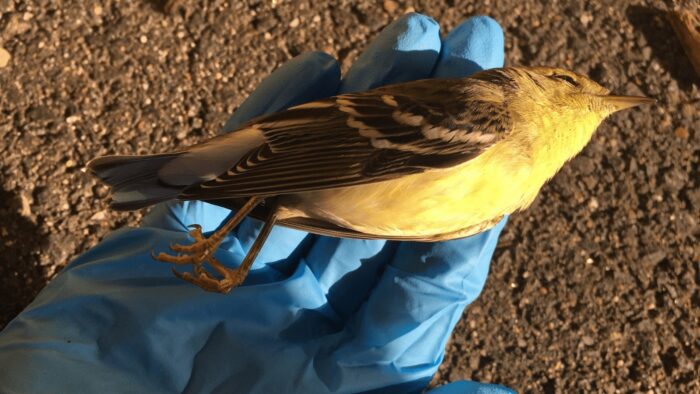Cities Leading the Way on Bird-friendly Building Policies

(NEW HAVEN)—A new report published by the Law, Ethics and Animals Program at the Yale Law School (LEAP) and American Bird Conservancy (ABC) reveals how local laws and policies are speeding up protections for birds, such as the Blackpoll Warbler, from deadly building collisions. The first-of-its-kind report, “Building Safer Cities for Birds: How Cities Are Leading the Way on Bird-Friendly Building Policy,” unveils critical insights and data that will help inform building design standards to significantly reduce avian mortality.
“A growing number of U.S. cities and counties have emerged as leaders in advancing bird-friendly building design and practice over the past two decades, in the absence of federal and state action to reduce bird collisions,” said coauthor and LEAP Executive Director Viveca Morris. “They have set an important example, showing that good bird-friendly building policies are possible, impactful, and affordable.”
A staggering number of birds are killed by window collisions each year in the United States, with estimates of up to 1 billion. ABC, a leading authority on preventing bird collisions, partnered with LEAP on the policy study, with four of its experts contributing to the report: Bryan Lenz, Kaitlyn Parkins, Christine Sheppard, and Anikó Tótha.
Research focused on the experiences of cities that have already passed bird-friendly laws, to empower other cities in doing the same. The report also features five in-depth case studies of municipal policies passed in New York, New York; Arlington County, Virginia; Madison, Wisconsin; Cupertino, California; and San Francisco, California. Nearly two dozen policymakers, advocates, glass manufacturers, architects, scientists, and community members involved in designing, implementing or working on local policies were interviewed for the report.
Since 2008, more than 20 U.S. cities and municipalities have enacted bird-friendly building policies. The first law was passed by Cook County, Illinois. At least three bird-friendly building laws were passed this summer, including by Washington, D.C., and the states of Maryland and Maine.
“Policies are critical tools, because they have wide impacts, often beyond their local area. We don’t have the luxury of addressing this problem one building at a time,” said Christine Sheppard, ABC’s Glass Collisions Program Director.
Sheppard helped develop ABC’s official rating system for measuring threats to birds posed by different building materials — a standard that is now used in many bird-friendly building policies. Commonly approved bird-friendly materials include treatments for glass like fritting and etching, exterior insect screens, exterior blinds, and architectural features that shield large sheets of glass.
According to the report, bird-friendly building policies vary in scope and comprehensiveness by city. Laws share many of the same limitations, such as those in California that limit regulations to “bird-sensitive areas” near green spaces and waterways, while other hazardous parts of the city remain without regulations. Some policies include lighting provisions to reduce light pollution, which is also a key contributor to bird collisions. Yet none of the bird-friendly building policies studied apply retroactively to existing buildings.
“New rules and innovative strategies for mitigating existing building stocks are urgently needed, especially at high-collisions buildings,” explained Meredith Barges, coauthor of the study, policy researcher, and co-chair of Lights Out Connecticut. “The types of building renovations that trigger most laws will not happen fast enough to save many threatened birds in the decades ahead.”
Local governments could use a range of financial programs and regulatory policies to motivate developers, businesses, and homeowners to adopt practices, with strong participation rates. One successful example includes Arlington County, which incentivized bird-friendly architecture in 2020 with a density bonus requirement through its Green Building Incentive Program.
The report’s findings show that bird collisions prevention can be simple and inexpensive when following recommended science, technology, and standards. Morris, Barges, and the report’s contributors hope its conclusions will inform and inspire better local policies in the future to protect birds from preventable collision-related injuries and avoidable deaths.
“Building Safer Cities for Birds: How Cities Are Leading the Way on Bird-Friendly Building Policy” is a publication of the Yale Bird-Friendly Building Initiative, which aims to accelerate the development and adoption of bird-friendly building design. The Yale Bird-Friendly Building Initiative is a collaboration of the Law, Ethics and Animals Program (LEAP) at Yale Law School, the Yale Peabody Museum of Natural History, the Yale Office of Sustainability, and American Bird Conservancy. The Yale Bird-Friendly Building Initiative is supported by a seed grant from the Yale University Planetary Solutions Project.
ABOUT AMERICAN BIRD CONSERVANCY
American Bird Conservancy is a nonprofit organization dedicated to conserving wild birds and their habitats throughout the Americas. With an emphasis on achieving results and working in partnership, we take on the greatest problems facing birds today, innovating and building on rapid advancements in science to halt extinctions, protect habitats, eliminate threats, and build capacity for bird conservation. Find us on abcbirds.org, Facebook, Instagram, and Twitter (@ABCbirds).
ABOUT THE LAW, ETHICS & ANIMALS PROGRAM AT YALE LAW SCHOOL
The Law, Ethics & Animals Program (LEAP) at Yale Law School is dedicated to empowering scholars and students to produce positive legal and political change for animals, people, and the environment upon which they depend. In spring 2022, LEAP launched the Yale Bird-Friendly Building Initiative, which aims to accelerate the adoption of bird-friendly design on Yale’s campus and beyond. For more information, visit https://bird-friendly.yale.edu/.


